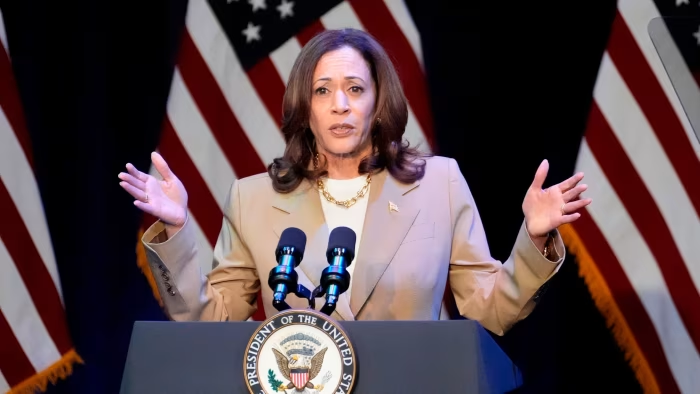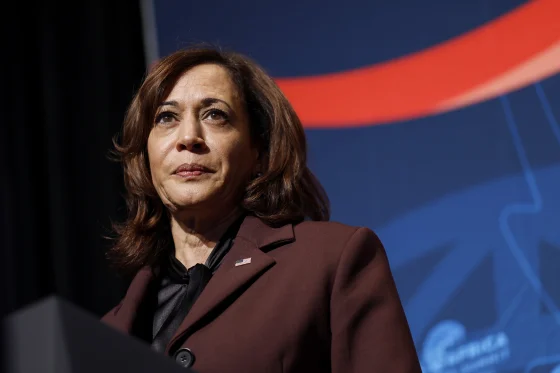Kamala Harris’s campaign and the Democratic National Committee (DNC) are offloading nearly $25 million dollars to down-ballot races across the country in “an earlier investment and far more money than the top of the ticket has sent in past election years,” Politico reported.
This decision comes on the heels of post-convention polling that has shown a stall in the momentum of the Harris campaign, raising questions about the viability of her candidacy and the Democratic Party’s confidence in her ability to secure the presidency in the 2024 election.
Campaign Realignment and Strategic Shifts
The decision to allocate these funds to down-ballot races reflects a significant realignment within the Harris campaign. According to sources familiar with the campaign’s internal discussions, the move is seen as a way to bolster Democratic candidates in competitive races, particularly in swing districts that could determine control of the House and Senate.
However, this reallocation also raises concerns about the Harris campaign’s confidence in her ability to win the White House.
According to Politico:
The transfers to support down-ballot races are notable both for their timing and large amounts. In 2020, the DNC transferred $5 million to the Democratic Congressional Campaign Committee and $1 million to the Democratic Senatorial Campaign Committee [DSCC] in mid-October, according to filings with the Federal Election Commission. Earlier money gives the committees more spending options, as common campaign tactics such as hiring staff, taping ads or printing mailers take time.
In a statement, Sen. Gary Peters (D-Mich.), chair of the DSCC, said the funds will “help Senate Democrats reach more voters, increase the strength of our campaigns and ensure Democrats protect our Senate majority.”
Polling data obtained after the Democratic National Convention indicated that Harris’s campaign was struggling to maintain the momentum that many in the party had hoped for.
The post-convention bump that typically follows such events was notably absent, leading to speculation that the campaign’s focus on Harris’s candidacy may not be resonating with voters as strongly as anticipated. This has prompted a strategic shift, with resources being diverted to down-ballot races in an effort to shore up support for Democratic candidates nationwide.
Implications for the Democratic Party
The decision to redirect funds highlights a broader concern within the Democratic Party about the upcoming election. By investing in down-ballot races, the party appears to be hedging its bets, ensuring that even if the top of the ticket falters, it can still maintain or even expand its influence in Congress and state legislatures. This strategy, while practical, also suggests a lack of confidence in Harris’s ability to galvanize the electorate on a national level.
It isn’t just the timing, but the amount of the spend, with this cycle’s reallocation of nearly $25 million dwarfing 2020’s investment, alarming left leaning political pundits.
Conservative Criticism and Strategic Outlook
Critics of Harris and the Democratic Party are likely to seize on this development as evidence of a faltering campaign. The redirection of funds may be viewed as an admission that Harris lacks the broad appeal necessary to secure the presidency. Furthermore, the focus on down-ballot races could be seen as an acknowledgment that the Democratic Party is more concerned with maintaining power in Congress than with ensuring a strong presidential candidate.
This strategy could backfire if voters perceive it as a lack of faith in Harris’s candidacy. By diverting resources away from the presidential race, the campaign risks undermining its own narrative and creating the impression that the party is already preparing for a potential loss at the top of the ticket. For conservatives, this could be seen as an opportunity to capitalize on the perceived weakness of the Democratic campaign strategy.
Potential Impact on 2024 Elections
The reallocation of campaign funds also has significant implications for the 2024 election. By focusing on down-ballot races, the Democratic Party is attempting to build a firewall in Congress that could limit the impact of a potential Republican victory in the presidential race. This approach may safeguard key policy priorities and ensure that the party retains influence in legislative matters, even if it loses the White House.
However, the conservative viewpoint may argue that this strategy indicates a party in disarray, uncertain of its own candidate’s ability to win over voters. The Harris campaign’s shift in focus could be portrayed as a sign of weakness, providing an opening for Republican candidates to challenge the Democratic narrative and position themselves as the stronger alternative in 2024.
Conclusion
As the 2024 election approaches, the Harris campaign’s decision to redirect funds to down-ballot races underscores the challenges facing the Democratic Party. While the move may strengthen the party’s position in Congress, it also raises questions about the viability of Harris’s candidacy and the overall direction of the campaign. For conservatives, this development could serve as a rallying point, highlighting the perceived vulnerabilities within the Democratic strategy and offering an opportunity to gain ground in key races across the country.

